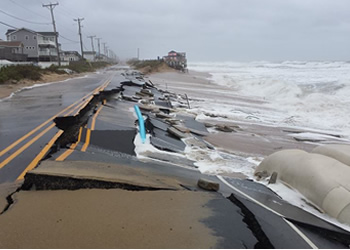
While Hurricane season in North Carolina is technically June 1 through November 30, weather professionals warn that our NC state is most at risk from August to October. The peak season for tropical activity is usually a six-week period from mid-August to late September, when North Carolina can experience multiple hurricanes or tropical storms in a short period of time.
In the wake of Hurricane season, we want to stress the importance of hurricane preparedness. Here in North Carolina’s Outer Banks, we have unfortunately become somewhat accustomed to tropical storms creating mayhem this time of year. Under a state of emergency, your community will likely have a very specific plan and strategy for residents, so be sure to tune into your local news channel for instructions and information. Things to consider are evacuation routes, local maps, shelter locations and emergency telephone numbers.
HAVE A PLAN IN PLACE – JUST IN CASE.
Here are some important steps to take that can help keep your family safe during hurricane season:

Have a disaster preparedness family plan: Talk to your children about what to expect, assign specific preparation responsibilities to each family member, update contact numbers on all phones, and set a family meeting place or contact person in case you get separated. Make sure everyone knows where supplies are, as well as utility shut-off valves. Have your pets microchipped, or make sure their tags have your contact information. Plan your evacuation route, and have a target destination or shelter in mind.
Put together a “Crucials” kit: This kit should contain information and items you absolutely need if you have to evacuate. In addition to clothing and toiletries, be sure to gather any important household, banking and insurance documents, medical histories, and contact information, and store them in water-tight containers.
Prepare your home: Actions you can take well in advance to protect your home are to reinforce your garage door, roof and gutters, and install strong doors with three hinges and long dead bolts that can resist strong winds. Take down old trees that might fall, and carefully trim limbs that extend over the house or near power lines. Before the weather event, bring in or secure all loose outdoor items. If you don’t have hurricane shutters or impact-resistant windows, cover glass with 5/8” plywood to protect against flying debris. Pile sand bags around doors and other areas where water can enter your house.
Shelter in place: All residents of the Outer Banks should have a plan in place in case the power goes out, or you are not able to leave your house for several days. Designate safe places in your home where there are no outside windows. The basement, a closet or the bathroom, may keep you safe during the brunt of the storm. Be aware of egress routes and make sure they are clear. Have a ladder and chain saw or axe inside the house in case you need to chop your way out and get onto the roof.
Hurricane Emergency Checklist
Supplies to keep on hand include those for sheltering in place or evacuating:
- Drinking water, non-perishable food for several days for family and pets, manual can opener
- Two-week supply of necessary medications (in case you cannot get to a pharmacy)
- Generator and gasoline
- Flashlights and batteries
- Basic household tools
- Battery-operated or hand-cranked radio to tune into alerts
- Crate or carrier for your pet(s)
- First aid kit
- Blankets and clothing
- Cash
Once your family is safe and secure, be sure to check on your neighbors. The elderly, disabled and others who feel they cannot afford to leave their homes may need encouragement, direction and kindness to help them understand the importance of following the warnings issued by your local leaders. Working together makes our community strong and safe during emergency weather situations.
The U.S. Department of Homeland Security also has a full list of hurricane tips that may be of help. The most important watchwords in any type of storm emergency are to have a family plan, be prepared, be smart, and stay safe.



